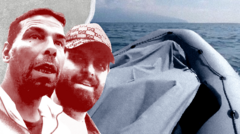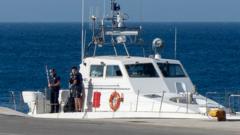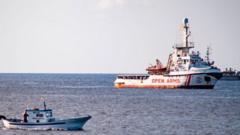An undercover BBC report reveals the alarming extent of a human smuggling operation in Germany, particularly in Essen, where inflatable boats for crossing the English Channel are being offered for up to €15,000. As the UK government pledges to combat these gangs, concerns mount over the increasing danger faced by migrants attempting these crossings.
Rising Threat of Smuggling Networks: Undercover Investigation Reveals Dangerous Boat Trade in Germany

Rising Threat of Smuggling Networks: Undercover Investigation Reveals Dangerous Boat Trade in Germany
A BBC investigation uncovers a lucrative network of smugglers in Essen, Germany, selling inflatable boats for perilous crossings of the English Channel, amidst growing concern over migrant safety.
A recent undercover investigation by the BBC has highlighted a troubling surge in human smuggling activities in Germany, particularly in the city of Essen. An undercover journalist, posing as a Syrian migrant, discovered offers from smugglers selling packages that include inflatable dinghies, engines, and life jackets designed for dangerous crossings of the English Channel. The price for the entire package reaches around €15,000 (£12,500), a considerable amount for desperate individuals seeking a better life.
Historically, the UK and Germany have had differing approaches to the smuggling issue. While the UK government has vowed to "smash the gangs," the investigation reveals Germany as a key hub for illegal operations. The National Crime Agency in the UK has confirmed that many boats and engines used for crossings are stored in secret warehouses across Germany, as smugglers evade local law enforcement.
Essen's geographical location—its proximity to Calais—is strategic for smugglers, allowing for swift transportation of boats while avoiding increased police scrutiny in more monitored areas. Operatives employ a network of warehouses to minimize risks during police pursuits, indicating a high level of organization within these criminal networks.
The investigation does not merely uncover logistics; it reveals the potential casualties at stake. With the UN reporting a record number of crossings this year, the BBC's researcher expressed grave concerns upon examining the flimsy design of the dinghies offered, which industry experts label as "death traps." The risks associated with overcrowding such vessels are considerable, raising alarms about the humanitarian aspect of these crossings.
Despite the serious legal and ethical implications, the smugglers openly acknowledge the grey areas in German law regarding their operations, suggesting an unregulated environment that enables this illicit trade to thrive. The interior ministry in Berlin has defended its position, claiming that Germany is not a direct neighbor to the UK, thus complicating the assessment of smuggling activity.
Despite recent efforts, including coordinated police raids that led to numerous arrests and equipment seizures, experts claim that the reluctance of Berlin to view the issue as a priority hinders progress in dismantling networks. Authorities in the UK have expressed frustration with Germany’s legal framework, highlighting the need for improved cooperation to combat smuggling effectively.
In light of these findings, relations between Germany and the UK are strained as both countries grapple with the complexities of migrant crossings. Miscommunication and differing priorities may further delay vital actions needed to protect vulnerable migrants. The trial of organized gangs linked to smuggling and the aftermath of this BBC investigation signal an urgent call for unified action against this evolving threat, which can lead to even more tragic consequences if left unchecked.



















